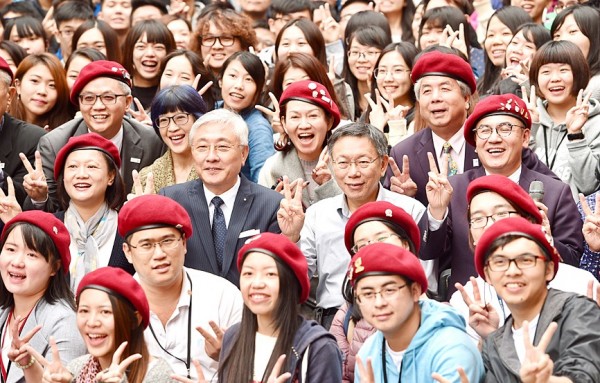《TAIPEI TIMES》 Elder subsidies not the way to handle rich-poor gap: Ko

Taipei Mayor Ko Wen-je, center right, makes the victory sign yesterday at a youth leadership camp held by Rotary International in Taipei. Photo: Peter Lo, Taipei Times
By Lee I-chia / Staff reporter
Taipei Mayor Ko Wen-je (柯文哲) yesterday said the widening gap between the rich and poor must be solved through taxation and social welfare, but annual local government subsidies to elderly residents to mark the Double Ninth Festival is not the solution.
Ko made the remark after he was questioned by reporters following his speech to a Rotary International youth leadership camp in Taipei yesterday afternoon, when he was asked about a comment he made in September comparing local governments’ cash subsidies to elderly people to buying votes.
Citing French economist Thomas Piketty’s book Capital in the Twenty-First Century, Ko said earning money with money is faster than earning money with labor, and that is why the gap between rich and poor is widening.
The government can solve the problem in two ways: imposing progressive taxes on the rich or establishing a social welfare system that takes care of minority groups and elderly people, the mayor said.
“Normally, NT$1,500 is given to each elderly person, regardless of individual requirements and situations. However, when money is spent, government policy should have a guiding effect. For example, the government could issue seniors with transit cards providing NT$480 per month for public transportation fares to encourage people to get out and participate in activities,” he said.
“Taipei is the only one [local government] not to give out cash subsidies, but other cities and counties giving out cash does not mean that it is the right thing to do,” he said.
Money should be spent in a way that achieves the greatest benefits, he said.
Subsidies for children are given out after reviewing household income and household registry locations, which means equal amounts are not given to everyone, the mayor said.
Cash for elderly people should not be handed out in equal amounts for everyone, he said, adding that improving the long-term care system is more important than handing out money.
Rotary International is scheduled to hold its 2021 annual convention in Taipei, with more than 40,000 people from more than 100 nations expected to visit for the meeting.
Rotary members asked Ko what type of city he would like to present to visitors if he is re-elected next year.
“With [so many] foreign visitors coming to Taipei, of course we want to make a fortune by having them max out their credit cards,” Ko joked.
The city has three years to prepare for the event and it will establish an ad hoc group to handle those preparations, he said.
新聞來源:TAIPEI TIMES














